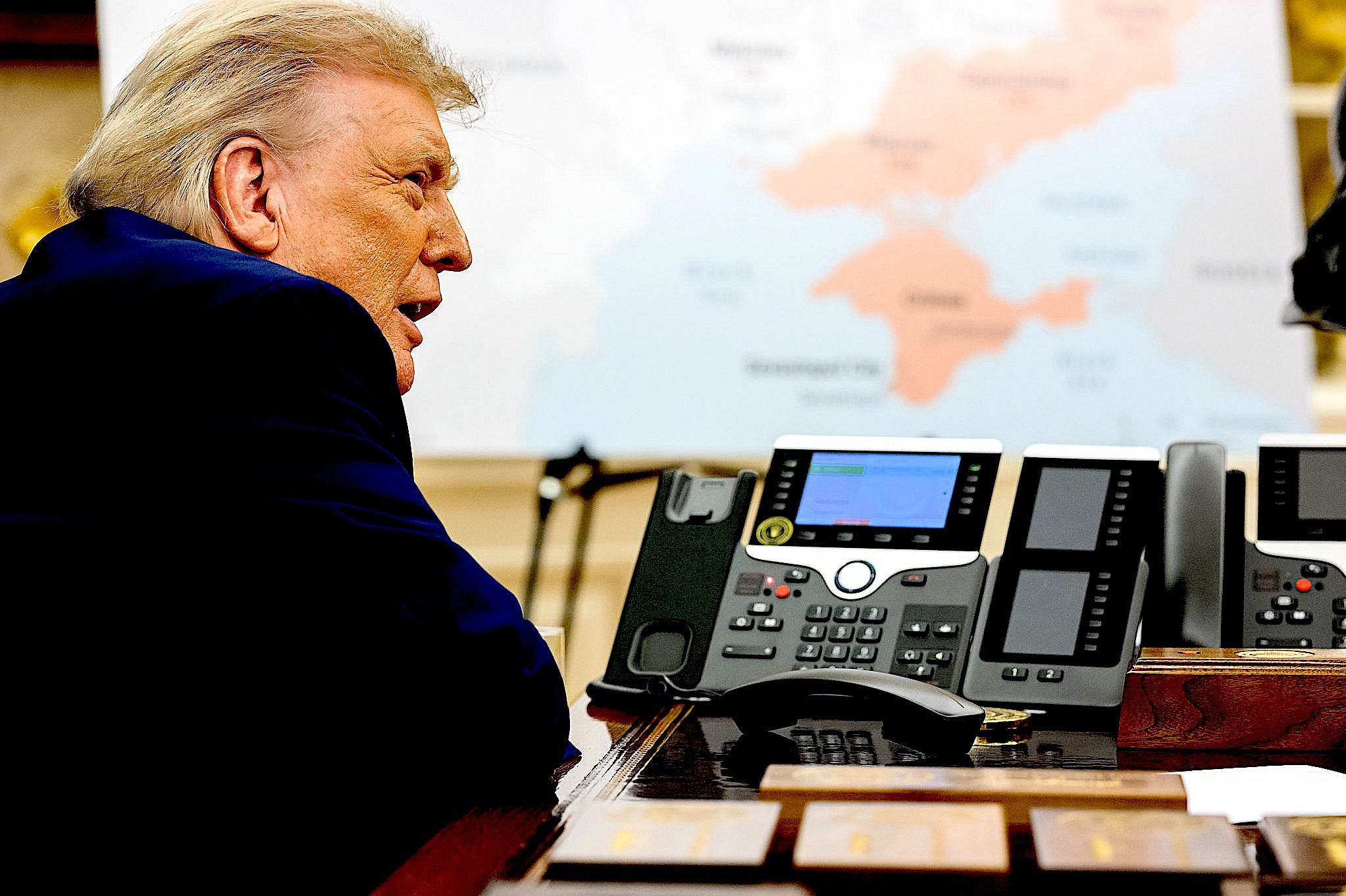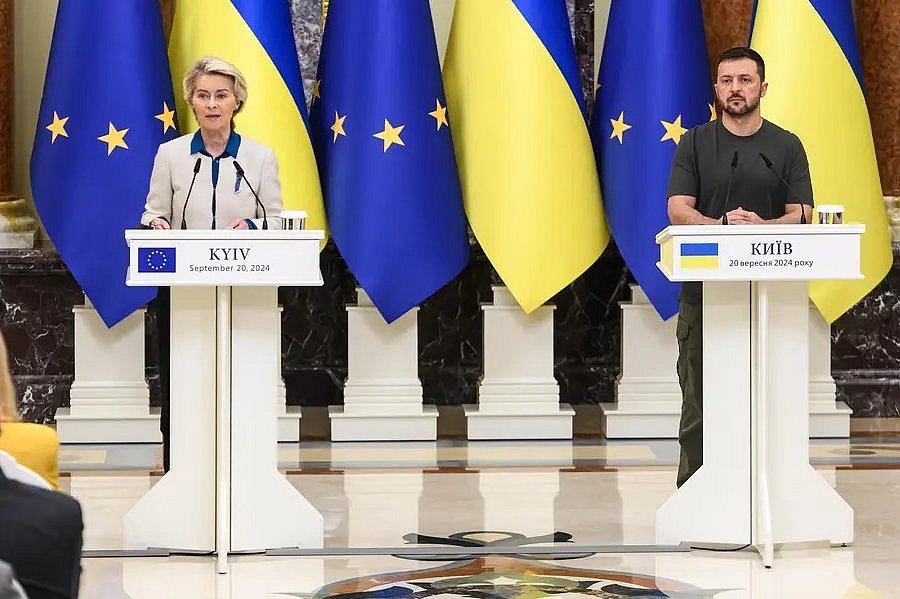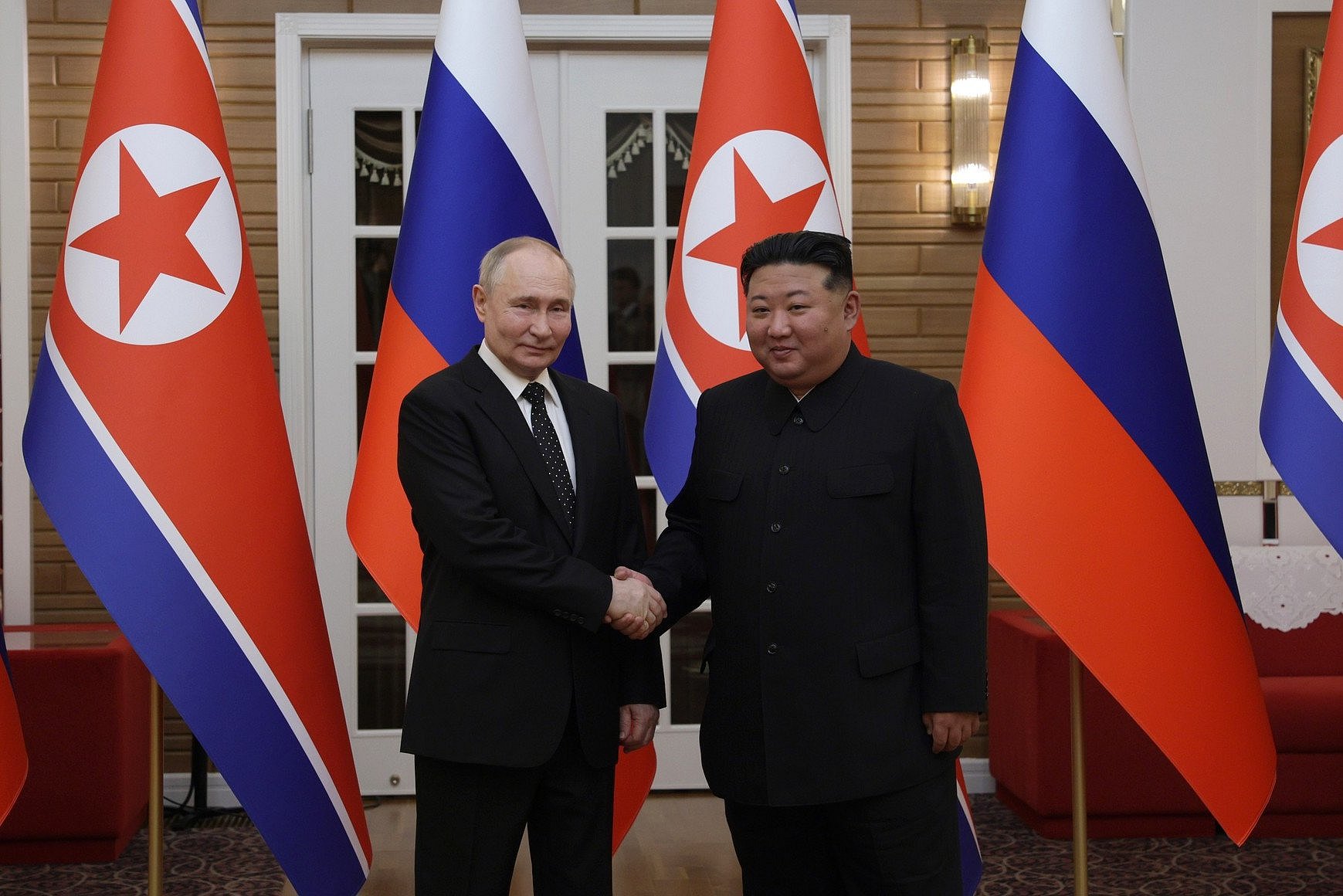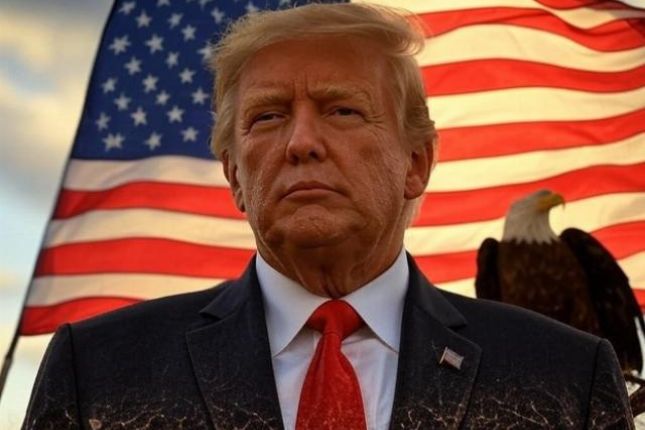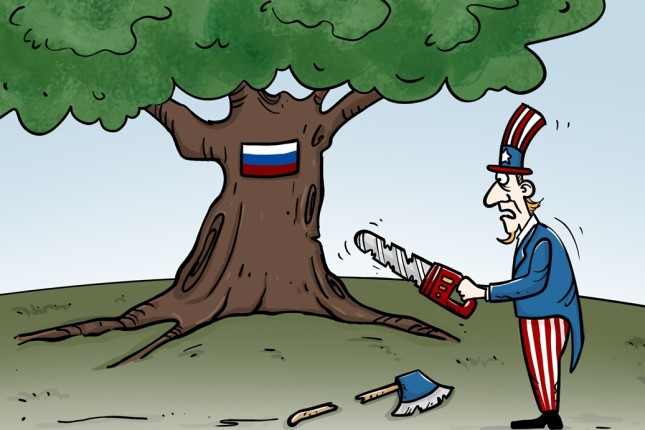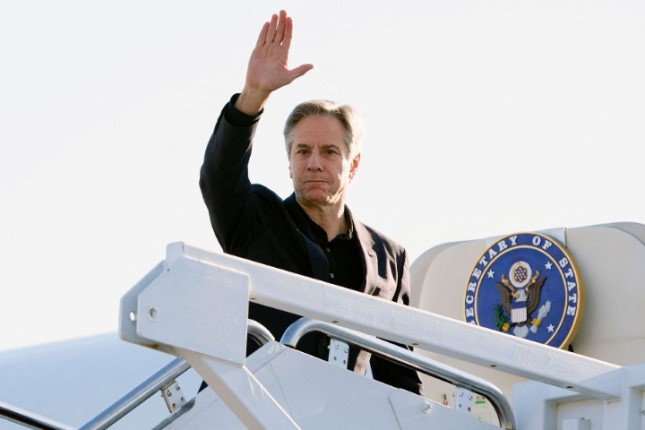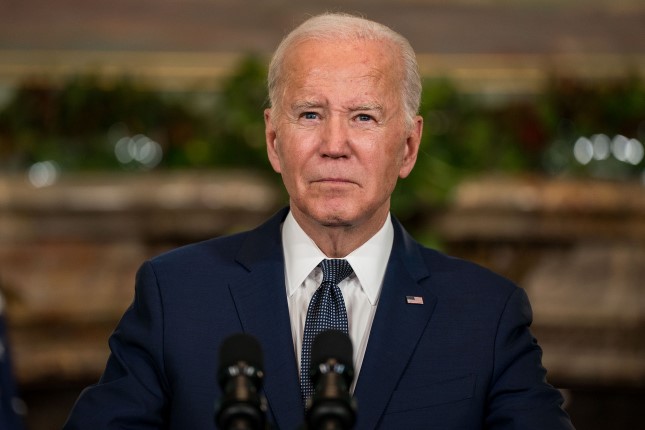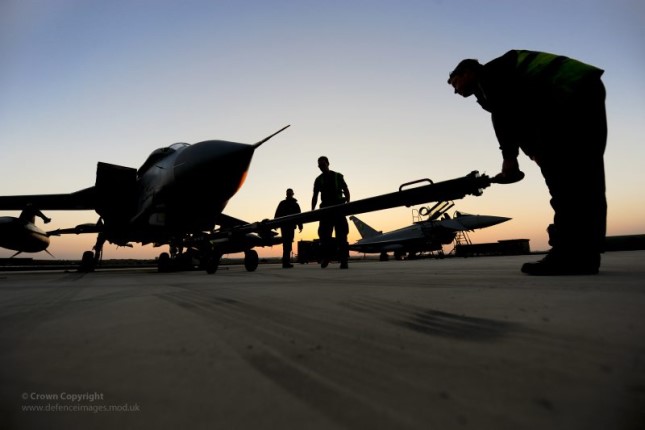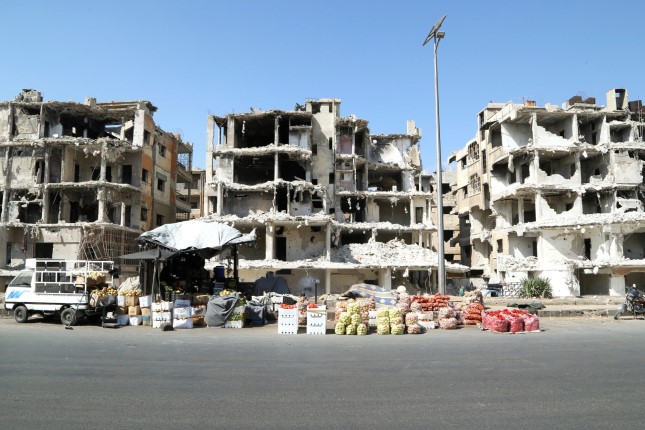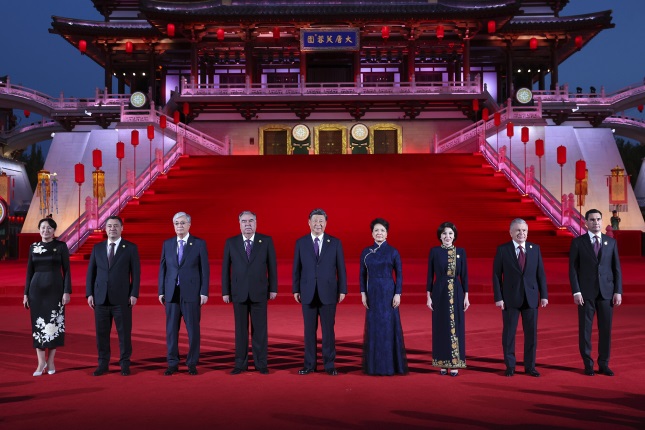The recent pilgrimage of leading European politicians to the Oval Office in modern-day Canossa confirmed the final decline of Europe as an autonomous, political force.
The top European politicians, members of the so-called coalition of the willing, which will apparently support the war in Ukraine to the last Ukrainian, went to Washington without an official invitation as informal companions of the Ukrainian autocratic president, Volodymyr Zelensky, whose official presidential term expired last year.
They were accordingly received in the White House as ordinary vassals.
Their meeting with President Donald Trump in the Oval Office was reminiscent of the ceremonial meetings of former Ottoman sultans with their vassals. The sultan sat on a lofty throne (Trump at the massive Resolute desk). The vassals could only speak to answer the sultan’s questions, as they did with Trump. They had to be dressed in their finest raiments (Trump demanded Zelensky wear civilian clothes, for instance).
By behaving in this way, European leaders humiliated themselves in the extreme before the master of American empire. This was witnessed in the jostling before the shoot of the commemorative group photo, when Ursula von de Leyen, president of the European Commission, tried to get between Trump and French President Emmanuel Macron. But Macron firmly pushed her away. She ended up last on the far left in the photo.
This visit of the self-proclaimed European elite to the White House will have major political consequences for Europe. It ended a period of apparent public unity of the Western collective alliance.
The U.S., as the dominant power, will from now on publicly prioritize its strategic interests. It’s obviously not clear yet to these Europeans politicians who took part in the Oval Office lesson in geopolitics that the strategic interests of the United States and Europe are increasingly diverging.
The U.S. is not interested in a strong if subordinate Europe. The latest agreement between Trump and von der Leyen confirms this. The EU agreed, without any resistance, to a 15 percent tariff on European products in the U.S., while American products in Europe will be exempt from all tariffs.
In addition, von der Leyen pledged the EU will buy as much as $750 billion in American energy products in the coming years, which are several times more expensive than Russia’s, and that Europe will invest at least $600 billion in American industry. If this does not happen, Trump is threatening to impose significantly higher tariffs on European products.
‘Autonomy’ an Empty Word for Europe
Nevertheless, von der Leyen behaved extremely arrogantly during her last visit to Beijing, instead of agreeing on increased cooperation that would at least alleviate Europe’s economic problems. On top of all that, she also agreed afterwards that the U.S. will be able to export genetically modified crops and food to Europe.
Current European elites, who have lived under U.S. shelter throughout the post-war period, are in no way capable of becoming independent. So-called EU strategic autonomy is an empty world. This is a new form of the so-called Stockholm Syndrome, wherein abductees identify with their captors after a certain period of time.
Trump’s peace efforts are also linked to his characteristic personal ambitions. He expects that if he manages to achieve peace in Ukraine, despite actively supporting the genocide in Gaza, he will win the Nobel Peace Prize.
He is flirting with the case of U.S. President Theodore Roosevelt, who was the first U.S. president to win it in 1906 for his successful mediation in the war between Russia and Japan. After his mediation, both warring parties gave in a little; Russia more because, as the loser, it recognized Japan’s control over Korea, also ceded southern Manchuria and Port Arthur to Japan. Japan gave Russia northern Manchuria. Both sides were ready for compromise.
Such an agreement, given that the Russian army is at present on the verge of victory in Ukraine, is not even theoretically possible today.
Despite strong opposition from the so-called deep state or war party in the U.S., Trump is trying to portray himself as a peacemaker who will end the war in Ukraine in order to refocus on its main goal China, which he sees as seriously threatening American global hegemony.
Trump expects that if he (and the West) recognize Russia’s annexation of four oblasts which have already been incorporated into the Russian Federation — Donetsk, Luhansk, Kherson, Zaporizhzhia and Crimea — Russia will gradually distance itself from China.
This would be the repetition of the successful policy of former President Richard Nixon, who managed at least temporarily to bring China on his side during the Cold War. It is almost impossible that this kind of strategic achievement will be possible today. China and Russia are joined with other BRICS countries engaged in building a New World Economic Order. Putin will under no circumstances align Russia with the totally unpredictable Trump.
Also, by slapping 25 percent tariffs on imports from India because Delhi does not intend to stop importing oil from Russia, Trump has indirectly facilitated a political rapprochement between China and India, two fierce rivals. In the eyes of the collective South, the U.S. is no longer a reliable partner.
In his poem Mimo naju tece cas (Time is Running Out), the Slovenian poet Alojz Gradnik notes that time inexorably passes and everything is fleeting. But leading European politicians don’t seem to understand this basic law of dialectics regarding the old continent: the time when Europe was considered a strategic power is over.
Spengler’s Assessment
The German philosopher Oswald Spengler, for example, in his work The Decline of the West more than a hundred years ago noted that the West was entering a period of definite decline, which it would try to stop by force. The West was becoming a civilization without spiritual energy.
This thesis is confirmed today by the decline of Europe, which has not so far, despite a severe war with global consequences raging on its periphery for more than three years, been able to produce a single peace or intellectual initiative to end the war. Moreover, it dogmatically rejects any contact or dialogue with Russia.
Influential American economist Jeffrey Sachs says he finds it difficult to understand that Europe has completely failed in this way. Colonel Jacques Bauld, a former member of the Swiss Strategic Intelligence Service, estimates that the current behavior of European political elites cannot be assessed rationally but only with psychoanalysis since they are acting against the core interests of their own countries.
How is it possible, for example, that German Chancellor Friedrich Merz opposes the opening of the second pipe of the Nord Stream oil pipeline, which has not been destroyed, and which would at least partially alleviate Germany’s current economic problems since Russian energy is several times cheaper than American?
The deindustrialization of Germany is one of the main sources of its increasing militarization. The ruling German elites, many of them heirs of Nazi ancestors, are trying to restore economic growth based on remilitarizing Germany. This pattern is echoes the rearmament of Germany before second World War.
It is no coincidence that Merz is talking about Germany having the strongest army in Europe, again. We are therefore approaching the era of a possible Fourth Reich based on so-called wartime Keynesianism.
German voters can hopefully thwart these plans. Polls show they are not in favor of either the continuation of the war in Ukraine or the increasing German involvement in it. At the moment, the only party that can threaten Merz is the AfD (Alternative fur Deutschland), which the government interprets as associated with neo-Nazis. It faces an official ban in a democratic state if it continues to gain support.
Germany, since at least the days of the Iron Chancellor Otto von Bismarck, has been a serious problem for Europe, both when it is too strong and when it is too weak. In connection with the present militarization advocated by the German political elite, some analysts have raised the question of whether the reunification of Germany was a mistake.
I remember that late well-known Yugoslav historian Vladimir Dedijer told me several times that Marshal Tito, when Germany was divided into two countries after the end of World War II, remarked “that he would not mind if it were divided into more countries.”
Winston Churchill said at the Tehran Conference in 1943 that Germany should be divided into several units so it could no longer threaten its neighbors. French Prime Minister Clemenceau said the same at the Paris Peace Conference in 1919. After the Napoleonic Wars, the French diplomat Talleyrand also advocated the division of Germany.
Germany will continue to be a European problem. Nonetheless, the German conservative politicians who rule Germany completely ignore the cardinal rule of Bismarck, that good relations between Germany and Russia are a condition for stability and peace in Europe.
In addition to Great Britain, which shows its former imperial hostility towards Russia, Germany is once again Russia’s main opponent, although it was economically dependent on it. France, on the other hand, merely makes ineffectual noises.
The Ukrainian Gordian Knot
The fact is that even if Trump and Putin come to a common formula for ending the war in Ukraine, they will not be able to untie the Ukrainian Gordian knot on their own. Even though it is not officially part of negotiating process, Europe may try to sabotage it, prolonging the conflict or trying to freeze it, such as on the Korean peninsula.
This would be the worst option. Europe would face long-term conflict on its periphery. Resolving the Ukrainian crisis will therefore have a major impact not only on NATO but also on the existence of the European Union, which is no longer a given.
As Professor Pascal Lottaz from Neutrality Studies notes, the EU is no longer striving to remain an independent power. Increasingly, the differences between the interests of individual countries or groups of countries are becoming more apparent. The EU cannot become a prisoner of the Russophobia of the Baltic states, for instance. Hungary and Slovakia strongly oppose the continuation of the war advocated by the leading EU members.
Russia will undoubtedly continue pressing for military victory if peace efforts fail, which could lead to the disintegration of Ukraine as an integral state. In this case, the question of all post-war borders in Europe could open again.
Will Warsaw try to integrate the part of Ukraine which was part of Poland before the Second World War? Will borders between Germany and Poland, drawn after that war be questioned? No EU politician wants to think about this.
Moscow has repeatedly stated that under no circumstances will Russia allow NATO member states to send peacekeeping troops to Ukraine in any form. Yet German, British and French leaders insist this remains a possibility. There is practically no possibility of reaching a compromise.
The best guarantee for the security and inviolability of Ukraine, according to Sachs, would be for it to receive similar guarantees as Austria did when it declared neutrality by state treaty in 1955. This was a condition for the withdrawal of the Soviet army. This formula has proven to be the most effective security guarantee to any country. The precondition for this solution is that Ukraine officially becomes a neutral state and drops its ambition to join NATO, something Russia demands and Ukraine so far refuses to do.
A new security structure in Europe is of utmost importance for the continent and the world, one in which Russia would be an integral part. The recently declared U.S. intention to establish a 99-year U.S. corridor in the South Caucasus between Armenia and Azerbaijan is hardly an encouraging indication that Washington intends to refrain from advancing its policy of military encirclement of Russia.
Some analysts suggest that, given that Europe is an integral part of the Eurasian continent, China should also be included in this structure as a guarantor.
If the West, or leading American politicians, had agreed to the requests of Mikhail Gorbachev, Boris Yeltsin and Putin to admit Russia into NATO after the collapse of the Soviet Union, or at least not to expand the alliance into the territory of the former U.S.S.R. (and if the Ukrainian authorities had not begun oppressing the Russian minority after the Kiev coup of 2014), we would not be facing the worst crisis on the European continent since 1945.
The Ukraine war is not a consequence of alleged Russian imperialism or the expansion of its sphere of influence, but of a conscious policy of the U.S. neocons to weaken or even disintegrate Russia as a country to regain the American of Russia of the 1990s and to put pressure on China to curb its further rise. In essence, it is an attempt by the West to continue to rule the world, just as it did for centuries and throughout the post-war period.
Similarly unstable periods known by the Latin term “antebellum” (time before war), have been a constant of history. The only difference between now and before is that atomic weapons were not yet known. We have a choice: Peace or total destruction.
Source: Consortium News.
